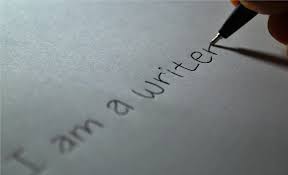
As a writer, or a teacher of writing, the learning is never complete. Writers can learn from each other, both by discussing with each other and reading other writers’ works. Teachers even learn from their students, as everyone has something unique to say. I believe that anyone can be a writer if they chose to be. Someone could be an excellent writer but still hate writing, so I would not consider them a writer. I have heard many professors say, “If you run, you are a runner. Thus, if you write, you are a writer.” I, however, disagree with this. Just because I sometimes run (and hate every second of it) does not mean that I am a “runner.” With this being said, I am not saying that people who aren’t writers shouldn’t write. Everyone can write, but not everyone is a writer. This may be a controversial opinion, but that is the beauty of writing; it is a place where people can express their thoughts and learn more about the thoughts of others. If people often write, enjoy it, and want to be a writer, then they are a writer.
Defining “good writing” is difficult because “good” is subjective, and it is also a word that, as a writer and tutor, I was told to never use. “Good writing” is characterized differently depending on the situation and type of writing. For a creative piece, “good writing” leaves the reader wanting more. For a professional or academic paper, “good writing” would be clearly conveying the purpose of the paper. Many students think that since they are not writers, they cannot write a “good paper.” “Good writing” is not black and white. Ølivind H. Solheim discusses what good writing means to them in “What is Good Writing?” One of my favorite things that is said in this article is that “good writing […] gives added value” (Solheim par. 11). “Good” writing has a goal and effectively achieves that goal.
A commonly known belief or stereotype about writers is that they are “dark.” I would have to agree with this, as this comment has been made about my group of writer friends and I often. Every time I would talk my girlfriend into coming to some sort of writing event with my friends and I (thank you for the support, Julia), she would comment on how dark and depressing we were. “Well yeah, we’re English majors,” we’d always reply, as if it was obvious. Darkness leads to better writing than cheer, at least in my opinion. This assumption is not uncommon. The Alcoholic Author and Other Writerly Myths… by Chelsy Ranard also notes this stereotype, as well as many others, such as writers being alcoholics and enjoying seclusion. Although I would agree that some writers, including myself, enjoy seclusion, I would argue that the alcoholic assumption is a negative stereotype that writers cannot seem to rid themselves of. I do not know any writers who rely on alcohol to allow that creativity to flow through them.
Despite the darkness that I see in many writers, I have also found that writers and teachers of writers are some of the most accepting people that a person could meet. In college, my English professors were overwhelmingly supportive and inclusive. I remember being a timid sophomore who was still “in the closet.” When I walked through the English house (where the professors’ offices were), I noticed that nearly every office had an “LGBTQ+ Safe Space Ally Training” sticker somewhere. An overwhelming majority of the English professors had completed it. The pledge and information about what the sticker means can be found here. Having that sticker was small but meaningful. I felt comfortable there, even before I really knew my professors. As I continued through my degree, the writers and teachers that I was surrounded by welcomed everyone.
In my future classroom, I hope to emphasize that writing is just as important as any other degree. I want to remind students that writing is everywhere and a vital part of any career. I hope to show that writing can be fun. Nevertheless, just as my professors displayed, I hope to show everyone that writers are extremely welcoming. I hope to encourage that inclusivity and inspire students to welcome new ideas, thoughts, and people into their lives. I want people to know that writing is a way for everyone to have their voice heard.
Works Cited
Ramblon, “I am a Writer,” Pixabay, https://pixabay.com/photos/writer-writing-paper-letter-author-605764/ Accessed 24 August 2019
Ranard, Chelsy. “The Alcoholic Author and Other Writerly Myths…” Editorial, Author Unlimited, 16 September 2016 https://authorunlimited.com/blog/writing-stereotypes,
Safe Zone, University of Findlay, https://www.findlay.edu/intranet/safe-zone/ Accessed 24 August 2019
Solheim, Ølivind H. “What is Good Writing?” Editorial, The Writing Cooperative, 14 November 2018. https://writingcooperative.com/what-is-good-writing-6379d77cd0c5